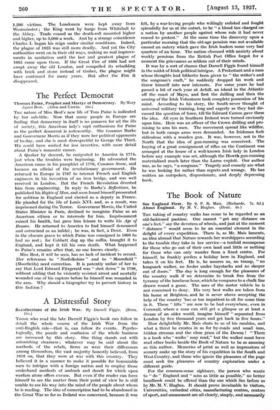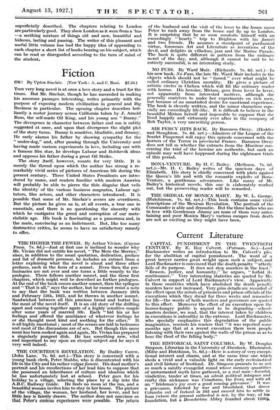The Book of Nature The taking of country walks has
come to be regarded as an old-fashioned pastime. One cannot " get any distance on one's feet," say the devotees of wheels, and just at the moment " distance " would seem to be an essential element in the delight of every expedition. There is, as Mr. Mais laments, an idea abroad that Nature rewards her worshippers according to the trouble they take in her service—a tenfold recompense for those who go out of their own land and little or nothing for those who can only wander from a fixed centre. For himself, he frankly prefers a holiday here in England, and takes it on his feet. He is, he assures us, no tramp, " no knapsack walker, no feeder under haystacks and no sleeper out of doors." The day is long enough for the pleasures of the country walk if we determine to break free from the tyranny of the luncheon hour, which he compares to a chalk lime drawn round a goose. The uses of the motor vehicle he is not concerned to deny. His very best walks are taken from his home at Brighton, and he is never above accepting the help of the country 'bus or too impatient to sit for some time in it. These " lifts " are now to be had everywhere, even in Cornwall, where a man can still get a glimpse or at least a dream of an older world, imagine himself " separated from London by five thousand years and get back in five hours."
How delightfully Mr. Mais chats to us of his rambles, and what a thirst he creates in us for by-roads and small inns, hidden streams and the close grass of the Downs " There is a book who `walks ' may read," but the walker must have read other books beside the Book of Nature to be as amusing as this author. Memories of print as well as impressions of scenery make up the story of his expedition in the South and West Country, and those who ignore the pleasures of the page must seek the pleasures of country exploration under a different guide.
For the common-sense sightseer, the person who wants to " do " England and " miss as little as possible," no better handbook could be offered than the one which lies before us by Mr. M. V. Hughes. It should prove invaluable to visitors. Universities, cathedral cities, manufacturing centres, centres of sport, and amusement are all clearly, simply, and necessarily superficially described. The chapters relating to London are particularly good. They show London as it were from a 'bus —a seething mixture of things old and new, beautiful and hideous, lasting and passing. The writer of this pleasant and useful little volume has had the happy idea of appending to each chapter a short list of books bearing on his subject, which can be read or disregarded according to the turn of mind of the student.































 Previous page
Previous page